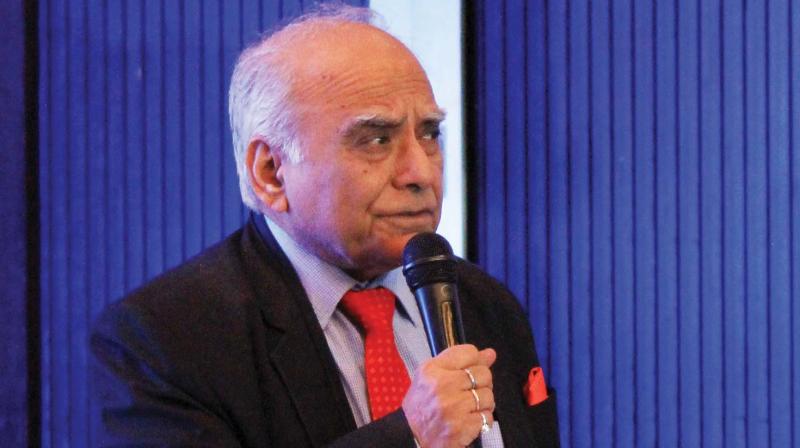Education key to stop diarrhoea: Professor Nirmal Kumar Ganguly
Experts dissect secret behind child killer.

KOCHI: India’s southern states, especially Kerala, were able to contain diarrhoea related diseases due to women’s education and breastfeeding, according to Prof. Nirmal Kumar Ganguly, president, Asian Conference on Diarrhoeal Disease and Nutrition. “South Indian states pip their counterparts in the north in preventing this disease. Social development is high in these states and if a child is breastfed at least for six months, the child is largely protected,” Prof. Ganguly said during an interaction at the three-day 14th ASCODD.
He explained that lack of girls’ education, malnutrition, paucity of latrines and gender imbalance are some reasons for states like Rajasthan, Uttar Pradesh, Odisha and Madhya Prad-esh struggling to ward off diarrhoeal diseases. Prof. Ganguly suggested WASH (water, sanitation and hygiene), balanced nutrition and vaccines such as rotavirus, typhoid vaccine and cholera vaccine as preventive measures for diarrhoeal diseases. “WASH can be connected to Swachh Bharat Mission, and other preventive activities could be linked to the National Health Mission, which moves to the lowest level of the healthcare,” he opined. “The disease is a hindrance to growth of India as diarrhoea leads to stunted children. If you have a stunted nation, its growth in every sphere is affected. So it is very much linked to development of a nation,” he stressed.
“Though mortality due to diarrhoea has come down in rural areas, it is still the second killer of children below five after pneumonia,” he pointed out. About the biennial conference, Prof. Ganguly said that during the early 60s or 70s, diarrhoeal diseases were one of the largest killers of children below five. “That was one of the major causes of morbidity in children up to adolescence, and for those who survived, it led to malnutrition and many children became stunted. Nutrition is the highest challenge still in India. Dr Firdausi Qadri from Bangladesh assumes charge as the next President post the conference and the ASCODD will be headquartered in Dhaka. Over 61scientists from countries, including the UK, the US, Bangladesh, Germany, India, France and Sweden, will present papers at the conference organised by the Rajiv Gandhi Centre for Biotechnology.
‘Genome sequencing can help prevent diarrhoea’
Genome sequencing can be useful to identify a novel antibiotic that can protect kids from Shigella bacteria-induced diarrhoea, a noted epidemiology and public health expert from the US said. Addressing the 14th Asian Conference on Diarrhoeal Disease and Nutrition (ASCODD) here, Prof. Colin Stine from University of Maryland School of Medicine, US, delineated the process of preventing diarrhoea using meta-genome and whole genome sequencing. “The process of identifying an antibiotic using genome sequencing invo-lves interaction of Shig-ella and Lactobacillus Salivarius, a probiotic bacteria found in the gastrointestinal tract. Incre-asing quantities of Lactobacillus Salivarius decreases diarrhoea due to Shigella,” he explained,
Prof. Stine, who was addressing the session on the topic “Understanding of enteric pathogens and NGS” during the inaugural day of the conference, said the whole genome sequence of Lactobacillus Salivarius helps identify the mechanism with which Lactobacillus Salivarius inhibits the growth of Shigella in culture. The researchers found that the supernatant from an overnight culture of Lactobacillus Salivarius inhibits the growth of Shigella in culture. They cloned and developed a cell wall hydrolase that kills Shigella in culture.
“From this, we have arrived at the conclusion that the cell wall hydrolase is a mechanism to protect children from Shigella-induced diarrhoea,” the expert told the three-day conference, being held at the Crowne Plaza in Kochi. Over 61 scientists from countries, including the UK, the US, Bangladesh, Germany, India, France and Sweden, are attending the conference, which has been organised by the Rajiv Gandhi Centre for Biotechnology (RGCB), Thiruvananthapuram in association with International Centre for Diarrhoeal Disease Research, Bangladesh (icddr, b); Translational Health Science and Technology Institute (THSTI), Faridabad; the INCLEN Trust International (INCLEN INT) and the National Institute of Cholera and Enteric Diseases (NICED), Kolkata.

